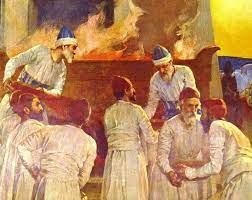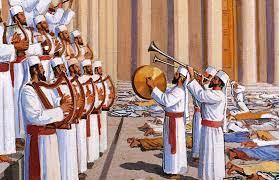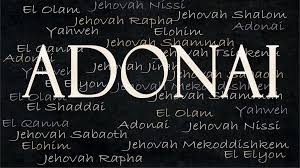Mutual Obligations
18: 1-32
The responsibilities of the priests and Levites,
the responsibilities of the people,
and the responsibility of ADONAI.
The atmosphere of the last several chapters in Numbers has gradually shifted. We began in Numbers 16 with 250 leaders offering strange fire that cost them their lives (to see link click Cr – The Response of God). The test of the tribal staffs in Numbers 17 was much calmer and ended with Aaron’s priesthood being firmly established once-and-for-all (see Cu – Aaron’s Staff Budded). As we move into Numbers 18, that narrative pauses for a time as first Aaron, and then Moshe, receive further mitzvot regarding the priesthood, which has been the main point of contention starting with the rebellion of Korah (see Co – The Rebellion of Korah). The mitzvot include mutual obligations of the people towards the priests and Levites. Because the people realized, more than ever, the necessity of a truly faithful priesthood, they were then ready, at least for the present time, to listen and be taught.
Numbers 18 begins with the words: ADONAI said to Aaron (18:1). The phrase occurs again twice in 18:8 and 18:20. In every other case in the Torah except in (Leviticus 10:8), God never spoke to Aaron directly, but always through Moses. In this case, YHVH gives Aaron the benefit of personal communication as a further sign of His special relationship to God. This, and the other events of preceding chapters, confirms Aaron’s status as high priest, a status that was under question ever since Miryam and Aaron’s rebellion against Moshe (see Bu – The Rebellion of Miryam and Aaron) and the challenges of the people in Chapter 16.
Ha’Shem’s word to Aaron stress the responsibility of the inner circle of Aaronic priests as mediators between the God of Abraham, Isaac, and Jacob and His people. The priests were to protect the people from drawing near to the holy things in the Sanctuary. Failure to do so would result in death of those who approached as well as the death of the priest responsible for guarding the holy things (18:3). The Levites formed a second line of protection around the Tabernacle. Together, the priests and the Levites guarded the Israelite camp from encroaching upon the holiness of God’s Presence in their midst. In this way, they protected the people from the wrath of Ha’Shem and the death that it brought (18:1-5). The service that the priests and Levites offered the people was a gift from YHVH designed for their own well-being. So, the support of the priests and Levites should have been generous and done with a sense of gratitude and not mere obligation (17:6-7).

The priests: Numbers 18:8 begins an extended summary of the animal sacrifices, the firstfruit offerings of crops, the firstborn animals, and the devoted items captured in holy war conquests that the priests were to receive as their due. The basic understanding is stated by ADONAI to the priests in this way: I Myself have put you in charge of the offerings given to Me. Everything dedicated by the people of Isra’el I have given and set aside for you and your sons; this is a perpetual mitzvah. In other words, the people made offerings to God, and God, in turn, passed those offerings on to the priests. Many of these same mitzvot concerning sacrifices and offerings are found elsewhere in the Torah (see the commentary on Leviticus An – The Offerings from the Priests Perspective). Their role here is to review the obligations the people bore to support the priests as they made their sacrifices and offerings in thanksgiving and repentance before YHVH.
ADONAI pledges in a covenant of salt forever that all the offerings of holy things which the people of Isra’el offer to ADONAI I have given to you, your sons and your daughters with you; this is a perpetual mitzvah, an eternal covenant of salt before ADONAI for you and your descendants with you (see Cx – The Salt Covenant). Salt is a preservative, and it often formed a significant part of the covenant meals and agreements in the ancient Near East. Thus, Chapter 18 deals with obligations and responsibilities on the part of the priests and Levites as well as the people of God. The system of support is extended to future generations as a perpetual mitzvah. This reminder pushes our gaze for a moment to the future of the wilderness generation in the Promised Land. Like the mitzvot on sacrifices and offerings in Numbers 15, the mitzvot here in Numbers 18 concerning the sacrifices, offerings, and devoted spoils of holy war (see the commentary on Deuteronomy Ag – The Problem of Holy War in the TaNaKh) all pertain only to the time when Isra’el entered into, and settled the land of Canaan. The long list of various sacrifices and offerings conjures up a picture of a lush and fertile land, settled and secure communities, productive agriculture, and herds and flocks on all the hills. This specific note about the sons and daughters of Aaron also point ahead to the death of Aaron (see Df – The Death of Aaron), and the succession of the priesthood to his sons. These mitzvot ensured that material support for the priests would continue even after Aaron was gone.
The primary rationale for the priests receiving the offerings made to YHVH is noted in Numbers 18:20. Ha’Shem declares to Aaron, “You are not to have any inheritance or portion in their land; I am your portion and inheritance among the people of Isra’el.” The priests lived in total dependence on God, with no property of their own in the land of Canaan. The priests were a constant reminder of what was ultimately true of all the Israelites; they all lived in dependence on the gifts and blessings of ADONAI.

The Levites: Numbers 18:21-29 turns our attention from the priests, the sons of Aaron, to the descendants of Levi (see the commentary on Ezra-Nehemiah An – Priests, Levites and Temple Servants). Basically, the Levites worked under the supervision of the priesthood (Aaron and his sons Eleazar and Ithamar), and that the work of the priests and Levites was different. The priests functioned primarily inside the Sanctuary with the holy things and the bronze altar; while the Levites assisted the priests by guarding the outside of the Tabernacle from any encroachment by any Israelite in the camp, carrying the holy things on the march, teaching the people the Torah, being gatekeepers, singers, and also serving as judges in the cities of refuge. ADONAI knew that the priests would need reliable helpers who could assist them in their duties. All priests were to be Levites, but not all Levites were priests.
The people: Although the Levites had been implicated in the previous rebellion of Korah and his followers (Numbers 16:1 and 7), God reassured them that their role in providing service to the priests would continue. ADONAI also assured them that they would receive the tithe (or one-tenth) offering of the people. God’s provision for the support of the Levites through the tithe offering reinforced, in no uncertain terms, their important role into future generations. The Levites, like the priests, had no tribal territory of their own, but were scattered throughout the Promised Land. Therefore, they were dependent on the LORD and the tithe offerings of the people (18:24).

ADONAI: In this final section, ADONAI turns from speaking to Aaron and speaks, instead, to Moshe (18:25). The reason for this is because God was instructing the Levites about their need to give an offering to the priestly sons of Aaron from the offerings that they had received. It would have seemed unseemly for Aaron himself to command the Levites to give an offering to Aaron and his sons, and so the LORD turned to Moses for that part of the mitzvot. The Levites receive the tithe or one-tenth offering to help support their life and work in the Tabernacle. In turn, the Levites were to give a tithe (or one-tenth) of the tithe they received to the Aaronic priests. That tithe was to be the best of what they received (18:25-31). In that way, the important, but subordinate, role of the Levites was built into the very structure of their ongoing support and ministry. The words to the Levites end in 18:32 with a final warning that any further revolts or misuse of the holy gifts of the people, as in the case of Korah, would only end in death.
The B’rit Chadashah also deals with the need to support the Messianic rabbis and pastors in their ministry of sharing the Gospel. Rabbi Sha’ul defended the need of the people to share its material benefits with the apostle and other congregational leaders. He even made reference to the priests and Levites when he asked: Don’t you know that those who work in the Temple get their food from the Temple, and those who serve at the bronze altar get a share of the sacrifices offered there? In the same way, the LORD commanded that those who proclaim the Good News should get their living from the Good News. Yeshua Himself sent out the seventy disciples on a mission to proclaim the Gospel without any money so that they would have to be dependent on the hospitality from the villages they visited: for the worker is deserving of his support (see the commentary on The Life of Christ Gv – Jesus Sends Out the Seventy). First Timothy 5:17-18 takes up the same idea in urging the support of the church’s pastors. Therefore, the people of God are called to diligently support those who shepherd them in their life of worship and service.346



Leave A Comment